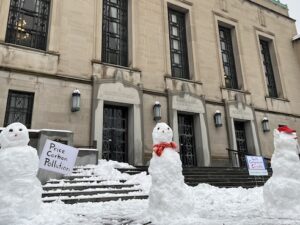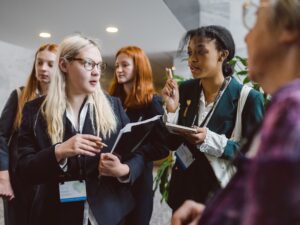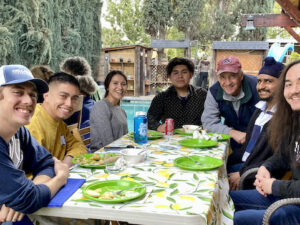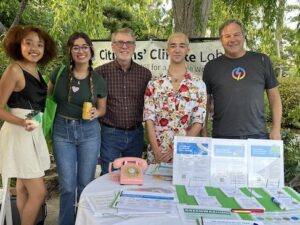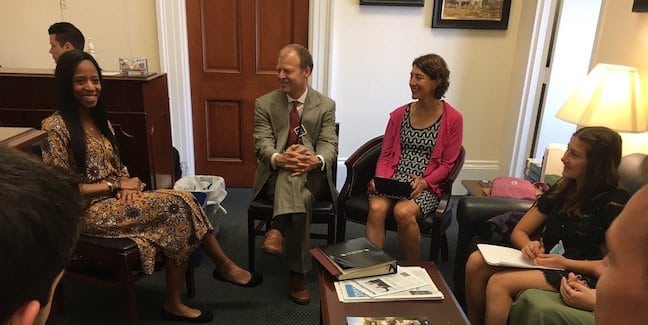
Utah Congresswoman Mia Love (R) met with CCL volunteers Tom Moyer, Lauren Barros, Mia Vinding and others in June.
By Stephanie Sides
“Utah is a red, conservative state with Republican supermajorities in both the Senate and House. In fact, in 2010, the state passed legislation stating that climate change is not real,” said Tom Moyer, a volunteer with the Salt Lake City CCL chapter in Utah. Sounds like climate advocates should just pack it up and head to a more favorable state, right?
Anyone but CCLers might do that. But we’re doggedly determined and eternally optimistic, so Tom Moyer and his fellow volunteers came up with a plan. “While CCL’s priority is federal carbon fee and dividend legislation, we have started making an effort to reach out to Republicans in the state legislature,” Tom explained.
“We’ve focused on state legislators because they are more accessible,” he said. “They are more receptive to their own constituents and have the opportunity to change their minds gracefully. With their constituents right there in front of them asking for action on climate change, it’s hard for them to say no.”
Tom said he and his fellow volunteers use all of CCL’s established protocols: “We call, write letters, and make personal contact to create relationships.” Face-to-face contact is especially effective. They also write letters to the editor praising supportive state legislators. No one else is doing this, so they stand out in this regard.
Liaisons to legislators and outreach events are key
More specifically, CCL volunteers in Utah are pushing passage of a Republican-led climate resolution, HJR018, and a Democratic-led carbon tax proposal, HB457. The success of these ventures depends on two approaches: the establishment of CCL liaisons to individual legislators and outreach events.
Tom explained, “We now have CCL liaisons to more than half, 57%, of the Republicans in the state legislature, and we’ve had face-to-face meetings with 20% of them.” They got right back to it after the Thanksgiving holiday, with another face-to-face meeting this week.
Tom started contacting people around the state to see who was willing to serve as a liaison. “I did lots of calling, using the CCL roster for Utah,” he said. “Sometimes we had just one CCL volunteer in a district. But I was surprised at how receptive people were. In my experience, people want to help but don’t know what to do.”
Tom said they brought eight Republican legislators to climate-focused events in recent weeks. Other events included Park City Interfaith talks, a dinner for legislators featuring Bob Inglis, and a climate event at the Kem C. Gardner Policy Institute at the University of Utah.
“Six Republicans came to the dinner, many of whom we didn’t think would be interested,” said Tom. The strategy was to invite many more than would attend. For the six Republicans who attended, they invited 30. “We got more reliable response from those members with whom we had met face to face,” said Moyer.
They have another climate event coming up soon in Southern Utah, where they expect to have four to six more state legislators attend.
And in January, a climate event will take place at the Utah Capitol during the legislative session. This event is being organized by Republican Utah House member Becky Edwards, and U.S. Congresswoman Mia Love (R-UT) will speak at it.
Utah Republican Congresswoman early member of Climate Solutions Caucus
Another sign of success in the state, but at the federal level, is that Rep. Mia Love, who represents the 4th district, was one of the earliest to join the Climate Solutions Caucus. Tom said, “We applaud Rep. Love for her leadership and courage in the face of traditional opposition to this issue. She showed that it’s possible to retain one’s conservative credentials and still take steps to address climate change.”
Many politicians recognize that climate change is real, but they struggle to navigate the politics of the issue. Tom and his fellow volunteers help them by suggesting acceptable approaches that offer them conservative company, yet don’t alienate their constituents. “We don’t have to work too hard on convincing them about the science,” he said.
Next steps on the 2010 resolution
After Rep. Love joined the caucus, a student group wrote a resolution to revoke the 2010 resolution and last session found a Democrat to sponsor it. But this created a potentially antagonistic situation with state Republicans. So to support Rep. Love, they convinced republican Becky Edwards to co-sponsor the resolution. She re-wrote it, adding Utah-specific language: Climate change is real, and the state needs to explore economically feasible ways to reduce greenhouse gases.
Though the resolution failed on a tie vote in committee, it did receive two thumbs-up votes from Republicans that CCL volunteers had not approached. So between legislative sessions, CCL volunteers contacted these two members to discuss how to push the resolution through.
Tom said their immediate goal is to get the resolution passed out of committee and get it a hearing on the House floor.
Clearly a glass-half-full kind of guy, as CCLers tend to be, Tom said, “Everything we’ve touched has been producing results. I’m crazy excited about our progress.”

